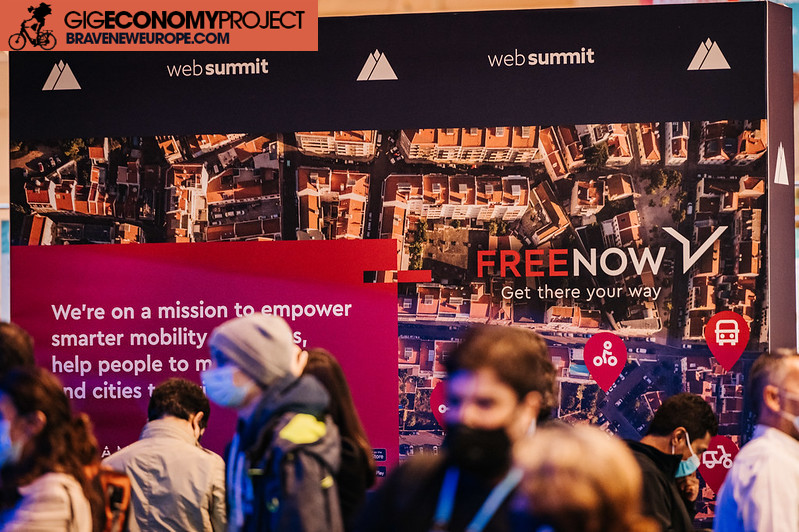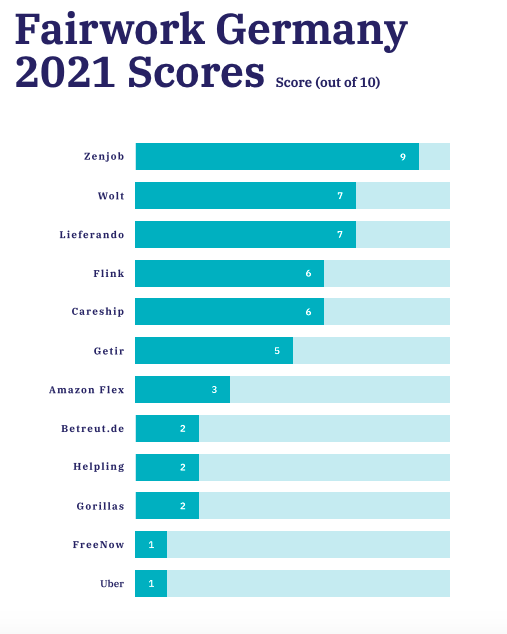Gorillas rated 2/10 and Amazon Flex 3/10, while Lieferando and Wolt receive 7/10

The Gig Economy Project, led by Ben Wray, was initiated by BRAVE NEW EUROPE enabling us to provide analysis, updates, ideas, and reports from all across Europe on the Gig Economy. If you have information or ideas to share, please contact Ben on GEP@Braveneweurope.com.
This series of articles concerning the Gig Economy in Europe is made possible thanks to the generous support of the Andrew Wainwright Reform Trust.

THE mobility apps Uber and FreeNow scored the lowest ratings in Fair Work’s 2021 assessment of the German platform economy.
The top rated platform was ZenJob, a digital platform connecting students with temporary jobs, with a score of 9/10, eight points better than US ride-hail giant Uber and Hamburg-based Free Now, which is part owned by car manufacturer BMW.
German private hire regulations require that both Uber and FreeNow limit themselves to offering their app to subcontractors, and the report found that during the pandemic “neither the platforms nor the subcontractors stepped in to compensate for the income lost during lockdowns, and instead expected their workers to rely on government aid.” The report also found that there was a “lack of evidence of close monitoring by the platforms of the contracts offered by subcontractors”.
In app-based food delivery, Gorillas, the Berlin-based grocery delivery company, scored the worst score, just 2/10, a result which was matched by care platforms Helpling and betreut.de.

Fair Work, an international collaboration of academics aimed at highlighting best and worst practices in the platform economy, announced the results in an online event on Tuesday [1 March]. Platforms are rated based on five criteria: fair pay, fair conditions, fair contracts, fair management and fair representation. Interviews with workers and management, as well as desk-based research, informs the evaluation.
Report author Dr Oğuz Alyanak, from the Berlin Institute of Technology, told attendees that 2.8 million workers earn their income through platform work in Germany, and although there had been increased competition for platform workers over the past year there had “not been increased competition in improving labour standards”, with “precarious conditions” still a widespread problem.
Although most platforms pay wages which exceed the minimum wage (€9.60 per hour), only two platforms “could demonstrate they offer a local living wage after costs,” he added.
Alyanak credited “worker activism” with delivering a number of substantial improvements in Germany’s platform economy in 2021, including a Works Council at Gorillas in Berlin, permanent contracts at food delivery platforms Lieferando and Flink, and negotiations for a collective bargaining agreement between Lieferando, the platform with the largest market share in Germany, and the union NGG.
He also credited Zenjob with listening to FairWork during their consultation, and incorporating anti-discrimination and anti-harassment guidelines and piloting a worker representative model on the back of those consultations.
The report takes a deep-dive into Gorillas’ results, finding it received one point for “providing clear and transparent terms & conditions” and one for paying “at least the local minimum wage after costs”. Reasons for failure on the other eight criteria include: “payment issues, such as delayed or miscalculated payments”; bikes and equipment which do not “mitigate task-related risks”; contracts which “are not permanent and in some instances terminated without just cause”; and workers’ interaction with management is frequently “delayed” or “obstructed”.
Gorillas in Berlin was the site of a wave of wildcat strikes led by the Gorillas Workers’ Collective in spring and summer 2021, culminating in the mass firing of hundreds of striking workers. The report finds that “Gorillas worker activism serves as a powerful reminder to researchers and workers that workers voice is an integral part of the platform economy, and a necessary one to bring change to it”.
Commenting on the report, Professor Eva Kocher, Labour Law expert at the European University Viadrina in Frankfurt, described Fair Work’s study as an “inspiration”, but did take issue with the fact that “the issue of fairness is decoupled from rights” in the report.
“it makes a big difference if one can enforce something in the courts or is dependent on the manager or the employer of the organisation to implement fairness,” she argued. “In my view, to have an employment contract should maybe be valued a bit more [in the ratings], because my impression is that it makes a difference to all of these five criteria.”
An attendee at the event, Leon Krüger, who is writing his Masters thesis on Lieferando and work activism, also commented that he thought the presentation was “very interesting” but that “the scoring is too positive”.
“Lieferando gets 7 out of 10 points, although there are cold firings, union busting, an unfair bonus system, and employees partly have to pay for their work material themselves,” he said. “Perhaps the categories for the scoring should be slightly adjusted. I don’t think a company should get a point for paying the minimum wage.”
Organisations can now commit themselves to the Fair Work Pledge, with the WZB Social Science Centre becoming Fair Work Germany’s first partner, while the Berlin Senate Department for Integration has become an official supporter.
Click here to read the full report on Germany’s Fair Work Ratings for 2021.
To sign up to the Gig Economy Project’s weekly newsletter, which provides up-to-date analysis and reports on everything that’s happening in the gig economy in Europe, leave your email here.
Support us and become part of a media that takes responsibility for society
BRAVE NEW EUROPE is a not-for-profit educational platform for economics, politics, and climate change that brings authors at the cutting edge of progressive thought together with activists and others with articles like this. If you would like to support our work and want to see more writing free of state or corporate media bias and free of charge. To maintain the impetus and impartiality we need fresh funds every month. Three hundred donors, giving £5 or 5 euros a month would bring us close to £1,500 monthly, which is enough to keep us ticking over.


Be the first to comment